- Home
- Julia London
Highlander in Disguise Page 11
Highlander in Disguise Read online
Page 11
Ardencaple’s smile was looking less and less charming. “If I said it was near Stirling, would that tell ye where she is, then?”
“Of course it would!” Lucy furiously insisted.
“Then my sister is a better student of geography than I am,” Anna laughed. “I shall have to find it on my atlas,” she said pleasantly, and picked up her fork. “And I suppose you must have a castle of some sort there at Ardencaple? One of those massive medieval structures?”
“Miss Addison!” Mr. Bradenton said, laughing. “Would you have us believe that you’d judge a man by the size of his castle?”
The gentlemen around the table laughed aloud at that, Ardencaple the loudest.
“Oh, I do beg your pardon, my lord,” Anna said, nodding demurely to the Lying Scotsman as everyone began to eat. “It’s just that I’m absolutely titillated by Scotland. I find it so frightfully interesting, what with all the old earldoms.”
“Oh, me too!” Elizabeth Seaton avowed. “It seems a lovely place. Do you have family, Lord Ardencaple?” she asked, sparing Anna the necessity of doing so.
“Aye,” he said. “Siblings and parents and even a dog. Miss Seaton, ye must send my congratulations to yer cook. The venison is delicious!”
Several agreed that it was and turned their attention to the dish.
Anna, however, was not the least bit put off and carefully laid her fork aside. “Come to think of it, I am quite certain I’ve heard the name Ardencaple,” she said thoughtfully, tapping a finger against her bottom lip. “Ardencaple… isn’t that a name closely aligned with the duke of Argyll?”
Ardencaple abruptly looked up. Surprisingly, Mr. Bradenton chimed in with a hearty, “Argyll! Yes, of course! I had occasion to meet his grace at a shoot just last autumn. Quite a lovely chap, really. Are you acquainted, my lord?”
Slowly, Ardencaple shifted his burning gaze from Anna to Bradenton and smiled. “I’ve had the pleasure of being introduced to his grace,” he said amicably. “But I canna say we are close acquaintances.”
“Really?” Anna said. “So there is no relation?”
“Perhaps his lordship has brought his family tree, Anna, so that we might all study it closely,” Lucy said, to which several chuckled.
“That’s exactly the thing we need!” Anna said brightly, and a few of the gentlemen laughed with her.
But not Ardencaple. If looks could kill, she’d be dead and quite deeply buried. Anna laughed, picked up her fork again, “I must beg your pardon, again, my lord. My curiosity has overcome good manners.”
“No’ at all,” he said, for what else could he say? Anna smiled at him across the table. Ardencaple smiled back, but she could see the murderous glint in his eye.
She did not have another chance to goad him, for Bradenton began to talk about his family, which, Anna had to admit, was rather fascinating in and of itself, as no one knew much about him other than that he was quite wealthy and quite unmarried.
When the venison was cleared and the ices were served, the conversation deteriorated into little cliques, leaving Anna to try and make conversation with Fitzwater again. From where she sat, she could see Lucy and Drake in a deep tête-à-tête, and Ardencaple charming the silk drawers off Elizabeth Seaton and Barbara Lockhart. She was relieved when Lady Seaton reappeared and suggested the ladies withdraw so that the gentlemen could enjoy a smoke.
In the drawing room, Anna parked herself on a settee and watched as Lucy joined their mother and told her about Anna’s behavior during supper. She knew exactly what Lucy was doing, because her mother kept looking aghast at her, and Lucy kept sneering.
When she saw Barbara Lockhart approaching her, she moved a little on the settee and made room. “Barbara, how well you look,” she said politely as Barbara settled her large bottom on what was left of the settee.
“My father paid thirty pounds for this gown,” she said as she attempted to straighten the feather in her hair that kept dipping over her eye.
“Shocking!” Anna obliged her.
Smiling, Barbara planted her pudgy hands on her knees and looked about the room. “Wasn’t supper lovely? I thought it was lovely,” she sighed.
“Yes, quite lovely.”
“Ardencaple is lovely, too, isn’t he?” she said. “So exotic, really.”
“Mmm. Rather reminds me of Captain Lockhart.”
“Does he, indeed? I hadn’t thought of it!” Barbara said. Her brows knit in a frown. “He does rather resemble the captain, doesn’t he?”
Yes, he did. Exactly how, Anna hadn’t quite figured out. But she’d wager they were brothers. Cousins at the very least.
“He’s quite taken with your sister, isn’t he?”
What man in London wasn’t? “I couldn’t say, really.”
“Well, I hope for his sake that he’s not too smitten with her, for I think he shall be sorely disappointed.”
Anna looked at Barbara. “Disappointed?”
Like a girl, Barbara covered her mouth and giggled. “Don’t you know, Anna?” When Anna shook her head, she frowned. “Truly, you can’t guess?”
Anna shook her head again.
Barbara playfully rolled her eyes, then grabbed Anna’s hand. “Silly, Drake intends to offer for Lucy!”
Anna’s mouth fell open. “No,” she said low.
Barbara nodded fiercely. “I’m not to say a word, for I’ve been sworn to secrecy, you see, but really, what secrets can there be between two sisters? Well, future sisters,” she clarified, nudging Anna a little. “You must promise me you won’t mention a word to Lucy!”
“Barbara, are you quite certain?” Anna demanded.
“Of course! But it’s not to happen for a fortnight, at the very least—Drake needs to tidy up some of Nigel’s affairs first. But as soon as he has, it’s ticketyboo, off to speak with your father!”
When Anna did not react—other than to feel suddenly and terribly ill—Barbara giggled, nudged her again, and clasped her hand. “We’re to be sisters, Anna!” she whispered happily.
Twelve
I t was the most miserable affair Grif had ever suffered through in his life, thanks to the diabhal in the lovely dark green gown. If he’d been a little closer—say, within arm’s reach—he would have happily wrung her neck.
Who in God’s name did she think she was, questioning him like that? Did she think herself above the dictates of decorum? What exactly did she think gave her license to be so…so unbearable?
He’d taken his leave as soon as it was politely possible. Lady Seaton had been nonplussed by his quick departure, but Grif did not dare give the diabhal another inch, lest she expose him. And what was it, exactly, that the chit knew? Did she know more than that there was not, for all intents and purposes, an Ardencaple?
Disgusted, Grif arrived at Dalkeith House just after midnight. He stalked inside, wanting to express his anger to someone, but was met with cold silence. Growling beneath his breath, he tossed his hat and gloves and cloak aside and went in search of his compeers. A quick search of the ground floor turned up no one.
Grif’s mood was growing blacker by the moment, and he took the stairs two at a time. On the first floor, where he and Hugh had suites, he found no one. On the second floor, he found Miss Brody’s room empty and moved on to Dudley’s room.
Dudley was fast asleep, his snoring rattling the four walls. Striding to the bed, Grif put a hand on his shoulder and shook him. Dudley made a sound of disgruntlement, then rolled onto his side. Grif shook him again, only harder, and the old man came up like a shot, sputtering and grabbing at his nightcap. “Chan fhaic thu na beanntan leis á cheò!”
“Of course ye canna see the hills for the mist, Dudley! We’re in London!” Grif said, shaking him again. “There are no hills, no mist!”
Dudley blinked. “Aye.”
“Where is MacAlister?” Grif demanded.
Fully aware of his surroundings now, Dudley swung his skinny old legs over the side of the bed and stood gingerly, straighteni
ng his sleeping gown. “I canna say, sir. He departed shortly after ye did.”
Mary Queen of Scots, he was going to kill Hugh with his bare hands one day—he could feel it in his bones. “And Miss Brody?”
Dudley blinked, looked up in surprise. “Has she gone?”
“Diah, how long have ye been abed, then!”
“I canna help it, Master Griffin! Me gout aches something fierce!” he said, grimacing.
God in heaven, his gout. Grif sighed, patted Dudley on the shoulder. “I beg yer pardon, Dudley. I’m a wee bit out of sorts, I reckon. ’Tis no’ yer doing that MacAlister is a bloody rotten rogue!”
“Aye, sir,” Dudley said, easing back onto the bed so that he could rub his knees.
With a wince of sympathy, Grif asked, “Is there anything I can do for ye, Dudley?”
The old man shook his head. “Fiona, mo ghraidh, she’d make a poultice for me joints, but I donna know how she did it.”
Grif could hear the longing in his voice, and thought, for the first time since they’d come to London, that it was too much for the old man. “We must send ye home, Dudley,” he said softly. “We didna intend to be gone so long, did we, more than two months now?”
Dudley smiled wryly, but shook his head. “Aye, I miss me Fiona, I do,” he said. “But it’s important that we find the beastie, sir. I wouldna feel right leaving ye to find it on yer own, I wouldna.”
“Lay yer head down, Dudley, and donna think of it now,” Grif said kindly. “There’ll be enough fretting for us both on the morrow.”
Dudley nodded and eased himself down.
Grif bade him good night and made his way downstairs, fetched a bottle of whiskey from the drawing room, then settled in the small parlor off the main entry. He removed his coat, his neckcloth, and waistcoat, and loosened the shirt at his throat. Then he settled onto a large, overstuffed chair, where he intended to wait all night if he must to have a word with Hugh.
As it turned out, it was all night and part of a day.
The sound of a female voice raised over a male voice woke Grif, and he came out of the chair, grimacing in pain at the horrible crick in his neck from sleeping in the chair. He staggered to his feet and to the door of the little parlor, blinking into the dim light where Hugh and Miss Brody were arguing something fierce, Dudley standing by, hopping from one foot to the next as he tried to stop them.
“God’s blood, MacAlister!” Grif roared.
The three of them fell instantly silent and looked at Grif.
He glared at Hugh, who smiled unabashedly and pushed a hand through his hair. “Grif—”
“Save yer bloody breath,” he said through clenched teeth.
Hugh started toward him, holding his hands up in innocence. “I’ve an explanation—”
“Aye, one that involves gambling and whoring, I’d wager.”
“Now that’s where ye are wrong, lad,” he said pleasantly. “A wee bit of gambling, but no’ whoring.”
“How much did ye lose, then?”
Hugh shrugged. “A pittance. No’ more than forty pounds.”
Grif gave him a look of disgust, turned, and retreated into the foyer.
“Come now, Grif!” Hugh cried laughingly. “Surely ye’ll give me a chance to explain!” He followed Grif inside, with Miss Brody and Dudley on his heels.
“Explain it, then,” Miss Brody sniffed. “Tell his lordship how ye follow me about, sniffing at me skirts like a dog, then.” She looked at Grif. “Yer lordship, I’m naught but a poor Irish girl. I’m only trying to earn a bit of money for me family in Ireland. I’ve a good reputation and I’ll thank ye to help me keep it. Mr. MacAlister willna leave me be, what with his claims of love and devotion.”
“Keara!” Hugh exclaimed, his arms wide. “Ye wouldna want to alarm his lordship with silly gossip!”
“I’m already quite alarmed, thank ye,” Grif snapped. “I’d no’ be even a wee bit surprised if Lady Worthall has sent for the constable by now!”
“Ach, that old bat’s no’ worth yer fretting,” Hugh said dismissively. “I told her to mind her own affairs.”
Grif lifted his aching head and glared at his old friend. “Ye did what?”
Hugh shrugged. “I’ve grown weary of her meddling, lad.”
“Have ye lost yer bloody mind?” Grif exploded. “Have ye any idea what trouble she could bring if she were of a mind?”
“I havena lost me mind,” Hugh shot back, his expression darkening. “I’m sick unto death of her! And how in God’s name do ye expect me to sit about, waiting on ye hand and foot like yer bloody slave?”
“Ye agreed to be me valet!”
“Aye, but I didna agree to be a prisoner in this god-forsaken house! I’ll come and go as I please and I’ll speak to whomever I desire!”
That was it, the last straw. Whether it was his fatigue or his general disgruntlement with the situation, Grif hardly knew. All he knew was that his feet were moving ahead of his brain, and he took a swing at Hugh without really thinking.
Hugh ducked his swing and lunged for him, but Grif easily sidestepped Hugh at the last moment, then fell on him. He heard Miss Brody cry out, heard Dudley plead with them to stop, but he and Hugh were upon one another, arms flailing, legs kicking, rolling about the carpet into furniture. He heard one crash, then another, felt a wooden chair as it fell onto his back, but his mind was wrapped around Hugh and his determination to kill him.
It wasn’t until he heard Dudley shout, “Ye’ve a caller, milord,” and felt a kick in the small of his back with another, desperately hissed, “Caller!” that he finally let go of Hugh’s neckcloth, and Hugh let go his hair. For a moment, a very brief moment, the two men stared at one another, wide-eyed, as what had just happened sunk in. And then suddenly they were both desperately moving, clambering ungracefully to their feet.
Grif quickly wiped the blood from his mouth with the back of his hand and looked to the door.
And his heart stopped cold. Cold.
There, between a very angry-looking Miss Brody and a very frantic-looking Dudley, stood Miss Anna Addison, her bonnet dangling from her fingers, her parasol fallen to the floor in front of her, and her mouth agape.
There was nothing but a deadening silence, a silence that was filled with the sound of his heart pounding in his ears, as Grif could not seem to catch his breath.
Miss Addison was staring in horror at him. And at Hugh. And at Miss Brody, who had the cheek to eye her just as intently. It seemed like an eternity before Miss Addison at last dragged her gaze to Grif and said, rather unsteadily, “I beg your pardon, my lord, but the door was standing open.”
Dudley, God bless him, was the first to come to his senses, and swooped down on her parasol. “It is I who must beg yer pardon, miss. Might I show ye to the drawing room where’d ye’d be a wee bit more comfortable?” he asked, inching toward the door. Miss Addison blinked up at Grif, and with a small nod fell in behind Dudley.
Grif looked at Hugh; Hugh looked at Grif. Grif slapped him on the shoulder. “What in God’s name is the matter with ye? Mary Queen of Scots, we’ve done it now,” he said, dipping to swipe up his coat. “Make yerselves scarce and I’ll get rid of her,” he said, and stalked out of the parlor, shoving his arms into his coat, then dragging his hand through his hair, trying to put some semblance of order to it.
As he neared the drawing room, Dudley stepped out, instantly withdrew a kerchief from his pocket, and thrust it at Grif.
“What the hell is she doing here?” Grif whispered.
“I couldna say, sir,” Dudley said as he motioned to the corner of Grif’s mouth where he had, obviously, missed some blood.
Grif swiped at it with the kerchief, thrust it back at Dudley, and put his hand on the door. “Stand by, then—I’ll no’ be long.”
With that, he threw open the door, strode into the drawing room, and hands on hips, glared at Miss Addison. “What are ye doing here?”
Her spine stiffened and she lifted her chin. “
I might ask the same of you.”
“Ye might. But as ye are in this house, I suggest ye explain yerself.”
“All right,” she said, tossing her bonnet onto a couch. “I shall. I’ll start with this: I know you are not Lord Ardencaple,” she said, reaching into her reticule. “I know there is no such place as Ardencaple. I know what you’ve come for, and moreover, I know where it is.”
She withdrew something from her reticule, walked to where he stood, and gestured for him to open his hand. In his upturned palm, she laid a tiny ruby.
Had the floor opened up and swallowed him whole, he could not have been more shocked. Speechless, Grif stared at the ruby, then slowly lifted his gaze. Miss Addison’s chin was high, the spark in her eyes triumphant.
He was a proud man, and he’d as soon die than be bested by a woman. But by the same token, he was man enough to admit when he had been bested, and closing his fist tightly around the tiny ruby, he carefully closed the door behind him.
Thirteen
T he moment he shut the door and leaned against it, staring at her like some enraged beast, Anna’s heart twisted with fear. He was terribly disheveled, with a bruised eye and a cut lip. Some buttons from his shirt had been torn away and she could see the hair of his chest from across the room.
Worse, brutal fury had seeped into his green eyes.
“What is it, then,” he asked in a horribly soft, horribly cold voice, “that ye think ye have, lass?”
Honestly, she wanted to tell him, wanted to explain that she really meant him no harm, but she was so fearful that she could not find her tongue.
Lord Ardencaple took one long, menacing step forward, his hands still clasped at his back, and Anna had the distinct impression it took some effort on his part to keep them there. “What?” he demanded, much louder. “What is it that ye will use to taunt me now? Tell me!” he commanded.
“I, ah…I have this… thing,” she said shakily, and turned abruptly, walked to the other side of the room, as far away from him as she could get. “A, ah… gold thing,” she clarified.

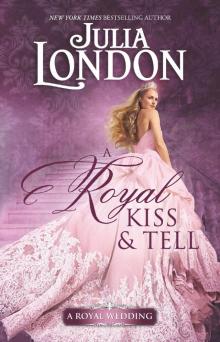 A Royal Kiss & Tell
A Royal Kiss & Tell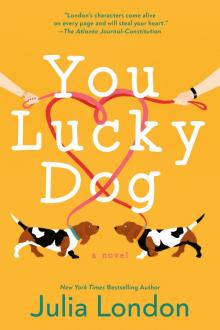 You Lucky Dog
You Lucky Dog The Devil in the Saddle
The Devil in the Saddle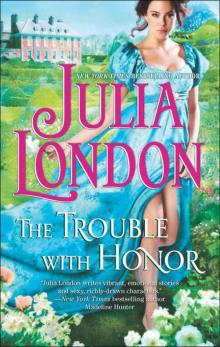 The Trouble with Honor
The Trouble with Honor Tempting the Laird
Tempting the Laird The Secret Lover
The Secret Lover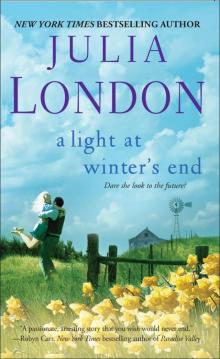 A Light at Winter’s End
A Light at Winter’s End The Charmer in Chaps
The Charmer in Chaps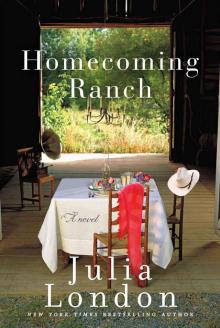 Homecoming Ranch
Homecoming Ranch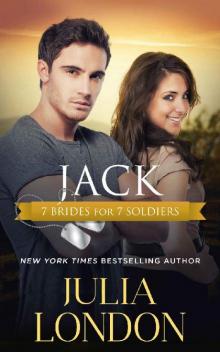 Jack (7 Brides for 7 Soldiers Book 5)
Jack (7 Brides for 7 Soldiers Book 5)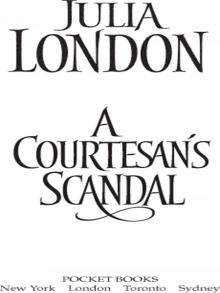 A Courtesan's Scandal
A Courtesan's Scandal Hard-Hearted Highlander--A Historical Romance Novel
Hard-Hearted Highlander--A Historical Romance Novel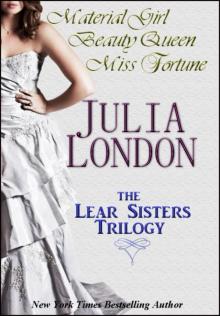 The Complete Novels of the Lear Sister Trilogy
The Complete Novels of the Lear Sister Trilogy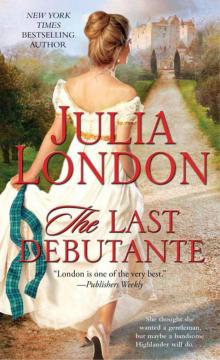 The Last Debutante
The Last Debutante Suddenly Single (A Lake Haven Novel Book 4)
Suddenly Single (A Lake Haven Novel Book 4) Seduced by a Scot
Seduced by a Scot Highlander Unbound
Highlander Unbound Suddenly Dating (A Lake Haven Novel Book 2)
Suddenly Dating (A Lake Haven Novel Book 2)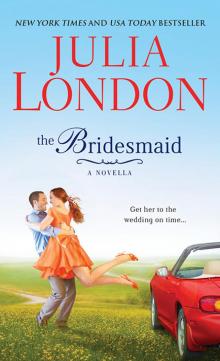 The Bridesmaid
The Bridesmaid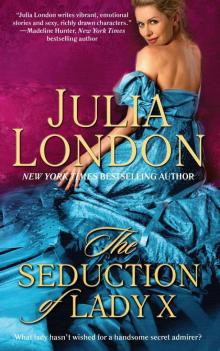 The Seduction of Lady X
The Seduction of Lady X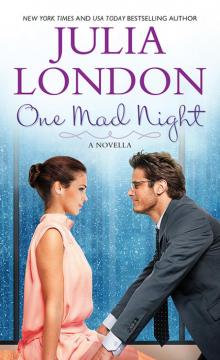 One Mad Night
One Mad Night Extreme Bachelor
Extreme Bachelor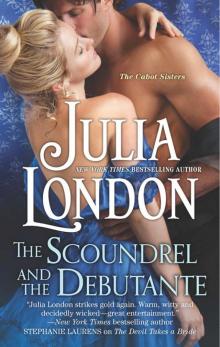 The Scoundrel and the Debutante
The Scoundrel and the Debutante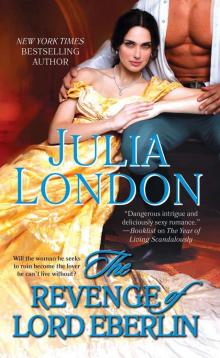 The Revenge of Lord Eberlin
The Revenge of Lord Eberlin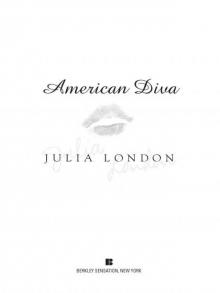 American Diva
American Diva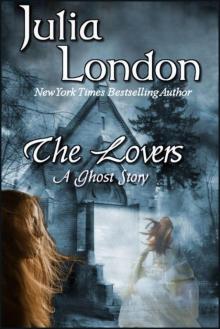 The Lovers: A Ghost Story
The Lovers: A Ghost Story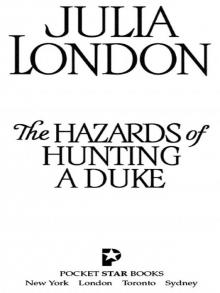 The Hazards of Hunting a Duke
The Hazards of Hunting a Duke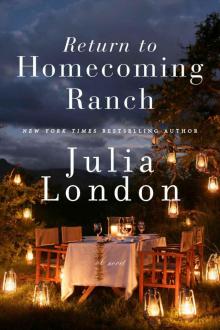 Return to Homecoming Ranch (Pine River)
Return to Homecoming Ranch (Pine River)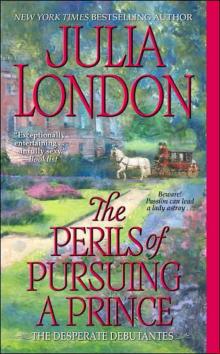 The Perils of Pursuing a Prince
The Perils of Pursuing a Prince Highlander in Love
Highlander in Love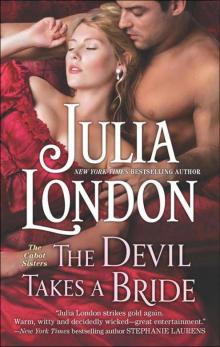 The Devil Takes a Bride
The Devil Takes a Bride Devil in Tartan
Devil in Tartan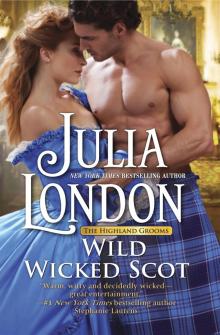 Wild Wicked Scot
Wild Wicked Scot Snowy Night with a Highlander
Snowy Night with a Highlander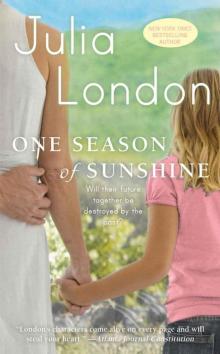 One Season of Sunshine
One Season of Sunshine Summer of Two Wishes
Summer of Two Wishes All I Need Is You aka Wedding Survivor
All I Need Is You aka Wedding Survivor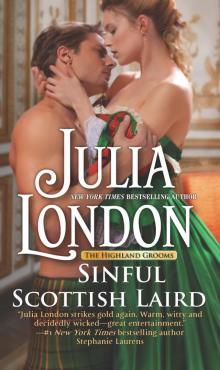 Sinful Scottish Laird--A Historical Romance Novel
Sinful Scottish Laird--A Historical Romance Novel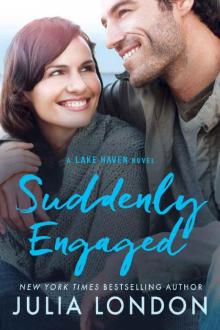 Suddenly Engaged (A Lake Haven Novel Book 3)
Suddenly Engaged (A Lake Haven Novel Book 3)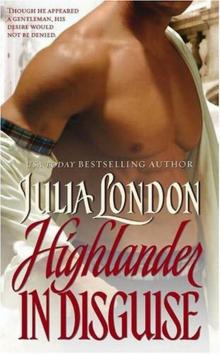 Highlander in Disguise
Highlander in Disguise Suddenly in Love (Lake Haven#1)
Suddenly in Love (Lake Haven#1)